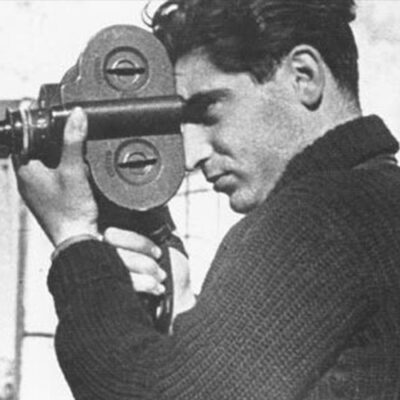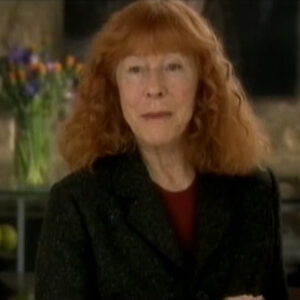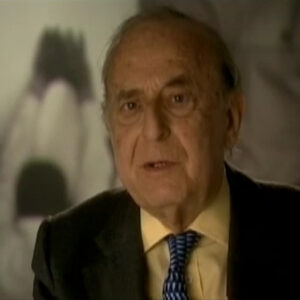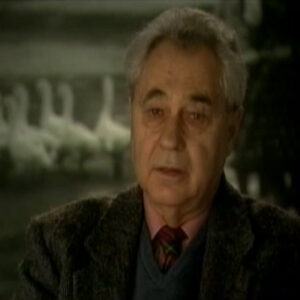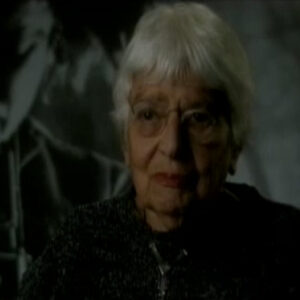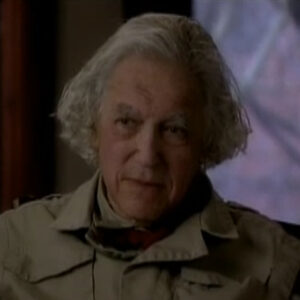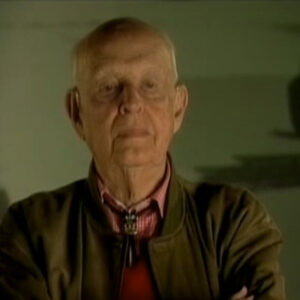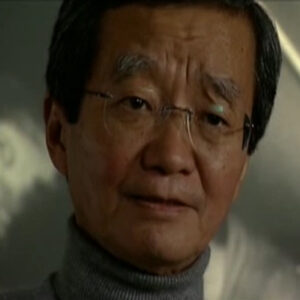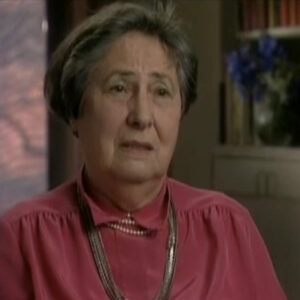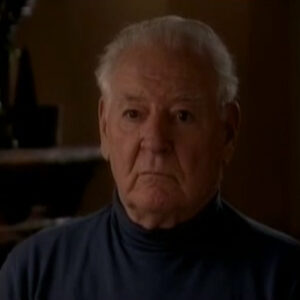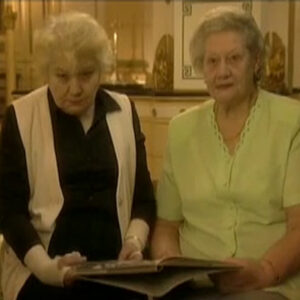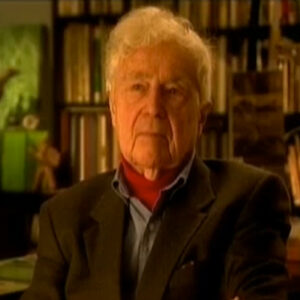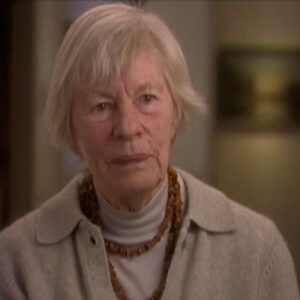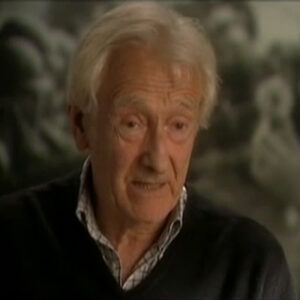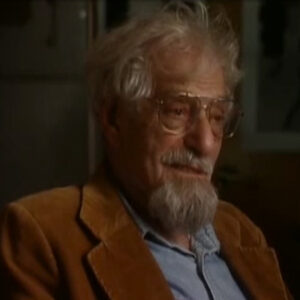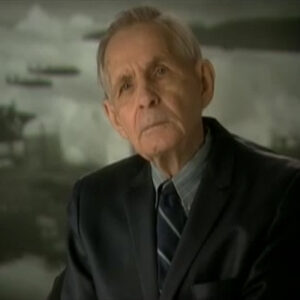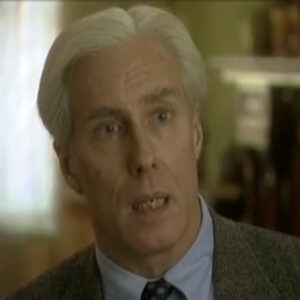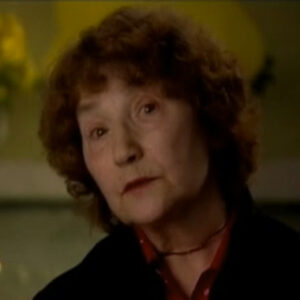Speaker Fifty years ago, a little bit more, the Pastoria Hotel in London was the meeting place of all the photographers, especially Capa and Capa, made it his home base.
Speaker He loved London and there was some during the war. There was the time and life of this on the street.
Speaker We’re going to come for a second. Don’t look at the camera. Only look at me. I didn’t Paddon. OK, that’s OK. I just wanted to catch it. OK. OK, but you’re doing great. We’re ready with the rolling. OK. Yeah. Yeah.
Speaker So right at the reflecting, her past story of hotel in London is a landmark for Magnum. Really, because after World War Two, a Kapela really fell in love with London. He used it as his base for operating and he found the story and it was a very relaxed place for him. And he became very popular with everybody in it. And it was a good meeting place. It was the centre in London for Fleet Street. People would not that far to come. So a lot of business went on and I call it Magnum’s first London base. And this is where all the negotiations went on and the editors would come and and Kepa had a way of meeting the important people.
Speaker He could sniff out information, set the scene. So you’re sitting at we’re sitting at a big table or what? It’s talking all the time and gesturing like the Hungarians do this right. You know, get very animated.
Speaker And he had this wonderful, charismatic attitude to everything.
Speaker And and he would spark up lots of enthusiasm for whatever he wanted, thought was important at the time. And he had a wonderful ability to sniff, sniff out the news. He could sniff out what was important, what was going to happen. And he was usually right. And he made friends with the editors, the photographic magazines, very quickly, especially with London Illustrated and with Len Spooner, who was the editor at the time. And very often I can remember the laying out of the next issue of Illustrated on course, one of the rooms of the past story.
Speaker People rather, gave way and let the run things from his corner.
Speaker It doesn’t quite look the same today, but in those days it was Kappos corner and everybody knew where to find him. And he spent a lot of time in London.
Speaker And did you know during the period just before D-Day when he was waiting to go over?
Speaker No, I didn’t know him. I didn’t know him until after the war. But I heard a lot about him and read Life magazine like everybody else in Life magazine. And he and and my husband, late husband, George Roger, were the to sort of war heroes. And we all knew about and got very good looking, but extremely different in temperament and in personality.
Speaker And that there were there were different.
Speaker And what their friendship was like with their bond was, well, they shared many common experiences on battlefields of war, but they were completely different in personality. And maybe that was why they were such good friends. They met first in Algeria and the invasion of Italy in Salerno, and they were together on that. And George always said that Capa was extremely reliable.
Speaker And I was the only one of the photographers and journalists, people, whoever knew what was happening, what was going to happen and how it would happen. And he made friends with generals, the generals, and he made friends with all the big shots, maybe because they liked to gamble a bit, drink a little bit. Anyway, he had a way of finding out who was important and how to get the news. And this happened right through his war years. I think he was he was in the front line.
Speaker So did they take pictures of the same events?
Speaker And they had six months together in Naples and this was life. Had to sign both of them to the same field, and they used to. Say, why can’t my life send me to India or why can’t life send me to Russia or why?
Speaker Why is it that we have to stay in Naples? And they used to send terrible cables back to life saying we’ve been here six months and now you’re going to send Margaret Bourke-White over here and and she will take all the best stories because, you know, Margaret Bourke-White is it’s the great lady and you always give her the best. Anyway, they had a pretty tough time in Naples and they shared a house together. Sorry I interrupted you.
Speaker And my boys will be so. So just if you could say again, start again. They had a house.
Speaker They shared a villa. George found this villa because they retired billeting under canvas.
Speaker And and he also in his way, he could make friends and he made friends with them. I think he was a writer and quite a prominent Italian. And George was saying, you know, we’ve been under under canvas all these months and it’s pretty damn cold. And the fellow says, well, I’ve got a villa. Let’s see if life can pay for it. And it wasn’t that much in those days. And so Capa and George moved in and then it became the sort of life HQ in Naples and they were there off and on for six months. And then they worked together in France. But it was during one short spell. In the summer?
Speaker No, sorry, OK, but it was there was a short time when they went off to night to the Isle of Capri, Cappa had a birthday and he said, come on, George, let’s get away from everything. Let’s go to the Isle of Capri and have four days off. So they took a little boat and went off to Capri and it was paradise. Nobody spoke about the war. There were still the same people living there, aristocrat, rich people and her beautiful palazzos. And of course, Kapper made friends with Moe. And very soon they were the they were having the most wonderful time.
Speaker But it was during a long boat ride that became serious and they started the scene. Perhaps of what would later become Magnum. Because they were. Complaining about how badly photographers were being treated and pushed around and neglected and their stories would perhaps not be acknowledged, they were sending the wrong information to go with the pictures in spite of all their laboriously made captions, because both of them worked hard on captions and on their text and everything. And it’s a package deal. And it became really very, very annoying that their work sometimes was not recognized as it should be. And so they said when this whole business is over, I think we should try and get photographers better rights, get their name recognized and let them keep their negatives. And what year was that? Forty three. Nineteen forty three especially. Keep their negatives because life had the copyright to both Bob’s and Georgias from Niantic. George had signed on the staff of life in nineteen forty three. To his horror, Cappa had talked him into it. He said you’ll get twenty dollars for a month. If you get on the staff and George, that’s not bad, excuse me, I think it was 20 dollars a week may go back.
Speaker Not again. Goods to capital George into joining the staff of life. So look.
Speaker Oh, boy, you get to start again, because I can’t really talk, George, into joining the staff of Life magazine, of which he had already joined in nineteen forty three. He said, look, oh boy, you’ll get an extra twenty dollars a week if you join the staff and I don’t see why you don’t. And George said twenty dollars a week. Sounds good, you know. OK, I’m doing the staff. I’ll be on the staff of life he was invited to.
Speaker He accepted and that was the worst mistake probably ever made, because Life magazine still keeps all its copyright and all his wartime work from forty three up to the end of the war. And Klepper.
Speaker When?
Speaker The war was over. And he grumbled about this for a long time, and in nineteen fifty four when Carol was killed. Cornell was still a photographer with Life magazine, and he managed to talk life into releasing the negatives, which was a very, very great move. So Cornell now has access to all of campus work.
Speaker I didn’t know that. That’s great. That’s great.
Speaker It was so hard for me to have a look life.
Speaker I mean, it’s the least I could do, really. I mean. You know, he on a life assignment. He was killed, at least think that life could do was to let it took a while, but they were good about it.
Speaker Do you remember where you were when you heard that Kevin died?
Speaker Let me tell you a little bit about how work all of them.
Speaker Let me just say this because hang on a second, because I’m going to help you get to go back to my place and.
Speaker OK, so you wanted to talk about several personalities at the end of the war?
Speaker We’re very sorry, but at the end of World War Two. There were these two heroes, and I met Kathy before I met George and I met her in the Office of Ladies Home Journal, which was the leading woman’s magazine, and I was very fortunate and got a job there when I was quite young because all the men were out fighting and there were jobs available.
Speaker And I worked with John Morris, who was my boss, and John had known, and George in Life magazine when he was bureau chief picture editor and in London. So Capa used to pop into the office. He was gorgeous, he was beautiful, and he had this wonderful musical, romantic Hungarian accent, it was really quite devastating. And he had bedroom eyes and he was really lovely. And I, of course, fell madly in love with having heard all about him for years.
Speaker And every girl fell madly in love with him, we all said when he came near and but I was just a little quiet office girl and kept my distance until.
Speaker I got to know Kaper later on as much different sort of person. But. He was a John Morris was very clever, and he got Kapa and Steinback to go to Russia in nineteen forty seven at the end of World War Two and Russia. We didn’t know what was happening, but we got permission and got visas to a lot of work, and Steinbeck and Kafka went off to Russia and did a wonderful story of just how ordinary people lived in Russia, brought it back. Ladies Home Journal ran it from page after page after page, and they had a color cover.
Speaker That gap I had taken was probably. The first one of the first color photographs put on the magazine.
Speaker And I think in a way, this was the start of Magnum, because after that, John Morris got the idea of doing people are people the world over and. Chose. Twelve families around the world. Farm families to be photographed in their daily life and. He hired Kepa. To do Russia, East Europe, that primarily the first farm which was in Iowa, and then he hired him to do France and and Holland, I believe, and he hired George to do these far off places like Pakistan and Egypt and Sudan. And it was through those letters that I wrote, George, and heard from him that I got my wanderlust for travel really got going because he wrote so beautifully about travel and I always wanted to travel. Anyway, the Ladies Home Journal ran these stories for 12 issues, and this happened to coincide with the time beginning of Magnum. And I have at home now because George kept everything the first account book of Magnum. And in it the first three items are Chhim. I don’t know exactly how many dollars from Ladies Home Journal for people are People and Cappa and George at all. It was not included in this because he didn’t want to become involved in something that he had to use a script he didn’t want to be told. He refused. That was typical and he didn’t like shooting scripts and there was definitely a shooting script. Otherwise I wouldn’t have been corresponding with George anyway.
Speaker So I also thought George was was asking what’s the shooting script for what?
Speaker He didn’t like shooting scripts either, but he was used to them and he knew what they were because they had a list of pictures that they wanted of each of the farm families, quite typical, sleeping and eating and hoeing the garden for them. They do. There were 12 different facets.
Speaker And why did that doing?
Speaker I didn’t know if I was you. OK, it’s me again. That’s all right. I don’t need it. You’re doing one. I don’t need that.
Speaker So I just I’m not clear on why the fact that the shooting script made George correspond with you, were you?
Speaker Because I was corresponding all the time because he he had great trouble finding his family in Egypt. First of all, they sent him to a model Egyptian family. And George spent about a week taking pictures of these people. And they were so stiff and they were to eat. They started eating with knives and forks. And he knew they’d never used a knife and fork before ever in all their lives. And he knew that the government of Egypt had been sending them beds to put these people in and making it look as if Egypt was on the same path, as you say.
Speaker So we had to find another family that was typical of Egypt at the time. And he did. He found a very good family who lived on the side of the Nile. But there was all this correspondence. And then finding a family in Africa, which took a long time to find the right family, he had two families that we had to turn down because, again, as George said there, too stiff. We can’t use them. And so he had to spend quite a bit of time.
Speaker His whole attitude to working and in in Third World countries was. Just walk around until two or three, maybe three days, until the children stop following him, and as soon as the children stop following him, then you could take a picture.
Speaker How can you make a comparison between Capa’s style of entering a community and photographing versus Jorges? Were they similar or maybe you don’t know about?
Speaker I don’t think people like to work at length on any kind of story. I think he was much more. Anxious to get on to something else, so he didn’t spend days and weeks. On a trip with a tribe like George in his. He was much to McKitrick, he was he was he couldn’t stay put that long, it wasn’t his way. He would go out and do a job and come back again.
Speaker And that George much preferred to spend time and take it slowly and really feel get the depth of. Of whatever he was doing, especially with tribal.
Speaker People and he did do that with the with the family, the London Blitz family capitate, which resulted in this what which you may know where the roads. We’re going to interview.
Speaker Yes, he did. But he didn’t spend an awfully long time. But he was here in London. He wasn’t traveling great distances. I think he didn’t want to be away from his friends. Two long. And they like to be in the center of everything where everything was happening. He wanted to be there and take control of what was happening to his friend, to Magnum, to he considered Magnum his baby. Really? It was his. It was really kapa. Who was the spark that got it going and he worked very hard on it, and this is where I found the other Kepa was when I went to Paris to work. After I left the Ladies Home Journal and I went to a researcher and then Capa was quite different. He also had his play time, but he could be very serious and extremely devoted to what he was trying to do, which was to make life better for photographers. And I think he succeeded very well in spite of tremendous difficulties.
Speaker I’m very interested in this, the sort of bon vivant cappa and the serious couple you have to learn more about now or well.
Speaker Going talking to George about those six months in Italy, and I often said, well, you know, work wasn’t Kappos sort of a playboy and Italy and how did you get on? And he said, well, he was he was much more levelheaded than you’d expect and very serious and really down to earth and worked extremely hard.
Speaker Did you see the Playboy element of him?
Speaker Oh, yes, of course, I saw a lot of that because the way the Paris office was run was quite bizarre in those early days. And it was it was very informal. It was scatterbrained.
Speaker It was whoever whatever pretty girl was in Paris at the time was immediately made a secretary and that every photographer had his girlfriend working there free for nothing.
Speaker It was a wonderful setup and it was a very good place to learn about photography and how to work and photography. It was a good learning place, but it was extremely informal. And most of the big discussions took place in the bistro down at the bottom and the first ground floor and kept playing the pinball machine and discussing what major story we ought to put in the picture post next week and interviewing a young photographer and that sort of thing. It just was quite fun. It was really fun and. Then there were the unfund times, too, because I mentioned the different personality between George and Koepka, completely different people. George was quiet and steady and he preferred being away from cities. He wasn’t that social minded, whereas guapa was in on everything, knew everybody, loved parties and loved gambling, made lots of friends very quickly and and and that the two of them still were very close. When it came to finances, things became a little bit tricky because Magnum. Had very little money, and it was on the borderline for a long time like this, and there were these awful meetings when it would start the pinball machine and then go upstairs and let’s talk it over and then we’ll have a meeting and we would come in and Jim would come in. Jim was very levelheaded about money and always was very nervous about it. And George was furious about it because Kaputt was in control and he was taking money from the till for his gambling exploits. And really it was a very shaky business. And so there were big arguments and and sometimes this would go on to quite late at night. And then Chimpsky would suddenly say, oh, come on, let’s go out to dinner. And she would find the best restaurant and everybody would go off and have a nice meal and then don’t start the next day. Again, back to let’s get this down on a financial status and. It was fun, but very tricky, how do we survive, how they survived in Paris and in New York, I don’t know, but I think it was due to luck, luck, luck. With the horses and luck with the cards and luck with the work and luck with the photographers that came in.
Speaker That was crazy. So, I mean, when he took the money to go gambling, was it for his own pleasure or for it was for his own pleasure. And it wasn’t for anybody else, as we were terrified when he put it there.
Speaker Of course he would put it back. Oh, yes, he borrowed it. But sometimes it was sometimes we had very, very, very difficult time. Difficult days. Ben. It is sort of, yes, we never really quite knew. Whether we’d ever be solvent.
Speaker But it certainly lasted. Now, you were telling me some interesting things earlier about Cappa and Russell, about how Cappa helped or encouraged him to switch and all that was very interesting to talk a little bit about that, and I’ll ask him about that as well.
Speaker Yeah, I think better. Yes, I think I’d be better if you talk to me about it if you can.
Speaker I definitely will. But it was nice to hear that you said it was.
Speaker What about, you know, you’ll never make any money with this and I don’t know, like.
Speaker Well, that’s a quote and I would like to have it properly quoted you. You have to get it out of the book.
Speaker OK, I can do that. I have read that actually, too, but I wouldn’t want it misread. OK, let’s see.
Speaker You were going to tell us about the African Queen incident.
Speaker Yes. Cappa wrote to all the photographers dash to let her off, but he was very good at keeping in touch with the boys in the field and. One particular episode we were. We were George and I were sent to the and to do a story which lasted for six months for the Marshall Plan on how. How the money was being spent in various territories of French West Africa, and that was a very, very difficult assignment. However, we accepted it because the pay was good and we thought we could improve and get some good stories in magazines and. Kapa had other ideas because he said, oh, you know, when you get there, you can break away and do something else, perhaps keep your eyes and ears open for anything else.
Speaker We were in the deepest, darkest jungle of the Guapo, working on a tropical. Forest.
Speaker And swamp and trying to show how the French would trying to build a road, an impossible area, and somehow we would. Send a cable and how it arrived, I can’t quite remember, but we got a message from Kappos saying.
Speaker Operated by John Houston is shooting the African Queen in. Kenya, I think it was, or Uganda not far from you. Get up, get up there and get all right to photograph the African Queen, a great film and got Katharine Hepburn and Humphrey Bogart in it.
Speaker And George looked at this, he didn’t like movies very much and he never wanted really to do movies, Capote was beginning to get into photographing in movies, and George wasn’t very keen. But anyway, how in the world do we get out of here to go to Uganda from the middle of the Gabon?
Speaker It’s impossible. And anyway, George said, who the hell is Humphrey Bogart?
Speaker That’s typical of George because he wasn’t a movie man at all. How did you go? We did not. We certainly didn’t. I rather liked it, but there was no way we could get there.
Speaker That’s a good story. Now you’ve got on your list of changed lives. Asked how did he change lives?
Speaker It changed our lives. He changed a lot of people’s lives just the way.
Speaker He went. Hey, we were.
Speaker Yes, it’s so clear to me how we heard about Cap and we were doing a story on the Nile. From the source to Cairo. And we were held up.
Speaker Because there was a strike on the Nile steamers and we were stuck in Juba for two weeks, we could send a cable. To say we were there stuck, but that was the only communication we sent cable to Paris and we wouldn’t be back for another couple of three or four weeks. At any rate, we got on the steamer, finally got on the railway, and we got to Waddi Health. In 1954, George and I were again far away, we were doing a story on the Nile from its source.
Speaker To Cairo. And we were rather held up because the Nile steamer went on strike and we’ve stuck in Juba.
Speaker Playing canasta and eating boll weevil bread for two weeks, and we’d had enough of canasta by then, but finally we got on the steamer and two weeks later than we should have been, we’ve got to wonder how far on the train and the state sticks out in my memory. I will never forget how I felt, how it feels. I can just remember everything about it was early morning. The train stopped at Wally Health and I got out of was shop and I said, we’ve got nothing left to read. I wonder if there’s anything. I found a copy of Time magazine two weeks old.
Speaker Rushed back to the train and.
Speaker George was sitting opposite me and I can just see the. I can just feel sweat running down his forehead. It was so hot and I can picture this railway carriage and exactly how it looks. It’s all in my memory. And I opened a magazine and saw a picture of Kapa.
Speaker I said, my God, he’s dead. I said, George is dead. And he didn’t say anything for a bit and then. You just said, oh, my God.
Speaker And he was killed doing US war story. George said, I thought he’d given up taking more pictures. Anyway, we got to Cairo in two days and flew back to Paris. And there was a complete a different attitude in the office. It was very sad and very tense. The funeral had already taken place. We were not able to be there. It was now. Too late, and so we had to pick up the pieces and.
Speaker Our lives changed. I think a lot of people’s lives changed after that. I think Magnum changed completely because the photographers that were left and Cornell, who gave up his job and life and joined Magnum, came over to help us out. Everybody said, well, we’ve got to make a go of it.
Speaker We’ve got to do it for.
Speaker Oh, dear, it’s hard to remember that. Sorry, I shouldn’t go back.
Speaker I get over that, you know, it was very emotional, but we decided he would keep on taking pictures. Cornell moved from New York to Paris and.
Speaker And then to London and Cornell.
Speaker Became a different person and he became a photographer in his own right. And he wasn’t he wasn’t a life photographer anymore. He was Cornell Capa with his own byline. And it didn’t say life. I think it changed him. And later on, as everybody knows, Kepa Cornell did so much for photography as much as his brother.
Speaker And on Wednesday, Don and Jim became a little shy, little quiet, Jim became the boss and took over finances, and then suddenly finances became much better and much better organized.
Speaker And everyone was fighting to keep this thing going. And it worked. And we did it for Kepa.
Speaker Oh, oh, were you like, oh, I didn’t think I would do that. I’m sorry. You know, that’s not going to be on it, I’m not going to do it again, I promise. Oh, I thought maybe we all need a little powder. Yes, I’m coming back. I’m sorry for your loss as well.
Speaker Very real.
Speaker And I think you don’t want to do anymore, OK, we’re off the subject now, OK?
Speaker Yeah, I have a. Where we live, we got left.
Speaker You ask some questions, OK? Right.
Speaker And we’re now rolling again. All right, well connected to what you were talking about, but you mentioned when we’re speaking downstairs about the gypsy lives that George and Cappa had asked and what on said.
Speaker Oh, yes, quite Gypsie now, no roots, not really sorry if you could start the full sentence. Well, they were all like that. I mean, they were all living out of suitcases. I think and I think photographers were so into their work when they got together, didn’t talk about it, they didn’t talk about photography. They just didn’t you know, they wanted to they talked about finances and run the office and who should run it and what’s the secretary doing and that sort of thing.
Speaker But they didn’t actually talk about what photography and how it should be so funny, but they didn’t. I think it was all they were so individual. Each of these Magnum photographers were completely different characters. And and so they and but they were they all have one thing in common. They were really Gypsie, because I think it was very difficult to. Have a stable home life and do what they were doing at that time, it changed when magazines started to fold and Magnum had to change its whole idea. I’m doing a quick magazine stories and then took on corporate work, had a different attitude to two stories, doing books, doing things that took longer.
Speaker And do you think that that that life that made the home life that why didn’t marry? Or I guess I should ask you, why do you think it didn’t matter?
Speaker Yeah. I think so also, he he had I won, I think so he was in love, very deeply in love with I think with four different women that I know, I mean, really deeply in love.
Speaker But I think he realized it probably wouldn’t have worked out. And I don’t think he felt that he should be tied or that they should be tied to him because this was his his life and he had a little room in the Lancaster Hotel in Paris, and that was his base.
Speaker And you were talking earlier about his life at the Lancaster and how they looked at him.
Speaker Oh, yes. He was their hero and. The Emil Wolf, who was the manager, I think I’m not quite sure of the exact story, but I know that Captain George saved his life. During the liberation of Paris. And he gave them.
Speaker Carte blanche to use the hotel as they wished and always had his little room at the top, and I think when when he died and she had to go in with Cornell and. They didn’t find. Very much other than his personal belongings and. He he was a gypsy. Hungarian gypsy, I guess what is Hungarian is very much a part of his character.
Speaker How did it manifest?
Speaker Yes. Charismatic, noisy, charming accent, which he used full of vitality, and there was just an old oh, I think a lot of Hungarians are like that. They’re good photographers, too.
Speaker Some people have said that the camera was kind of depressed in the 50s.
Speaker He had a lot of trouble with his back, which was a magnum or all photographers disease. They all had back trouble. And I can remember many times when Capone had to stay absolutely flat on his back because he couldn’t move in with so much pain. They all had it.
Speaker It was because they were carrying all these heavy loads on their shoulder.
Speaker And he was the spittle here, actually. Or if he was under beds. Yes, he was out there. That was what street that was. Yes. Could you tell us where that was or not necessarily? Can’t remember the hospital, but I know.
Speaker Yes, maybe the London clinic. I don’t know. I don’t remember. But I know there was a lot of when he was in agony. And Susie used to have to go over an. Do the Magnum business in his little room and sort out this in that, um. It it it was it was very bad, is back troublesome?
Speaker And some people have said he was kind of disillusioned about photography, and I think he was edging towards the point where he would give up photography. I think I’ve heard more than one person say that if he had lived.
Speaker He would not be a photographer much longer. He would go into television or he would go into movies. But he wanted to be where everything was happening and right up in the front. And perhaps. Perhaps. It might have been the end of Magnum. If copper had. Said I give up. You have to do something else. Can you imagine growing old now? We don’t want him to.
Speaker It’s not outrageous, but I wouldn’t dream of thinking of it. What do you think is the question? We don’t know what you’re talking about.
Speaker I couldn’t I could never see the idea of getting out. I wouldn’t dream of it. I don’t want to think about the idea of his getting old because I like to see him as he was and nobody want to accept, you know, really, he was under 50.
Speaker He had.
Speaker Everything was going for him. So we like to think of him as he was. In a way, he escaped from he escaped a lot of things.
Speaker Yeah, now you said that he was deeply I’d love to have you talk about especially Pinky and I don’t know whether you knew him during the Burgmann years, Ingrid Bergman time.
Speaker But has he disappeared? He went to California.
Speaker So we didn’t see much of him at that time, I was before before I knew him.
Speaker And Pinky, you knew you said pretty well, I didn’t know Pinky well that I heard an awful lot about her and I’d met her several times. But I’d read about her, and it’s mostly from hearing about her from other people, and she had she’d had a very bad operation, a went wrong, and she was in great pain. And I remember. Someone saying and George saying it was George. Pinky was at this party.
Speaker And she looked absolutely fantastic, he would never know she’d spent weeks in hospital. She was lovely and was at the famous party with Hemingway.
Speaker Oh, there were lots of those lots of famous parties with the Hemingway.
Speaker And did you hear stories about those?
Speaker Yes. But George wasn’t a party man. Not really. And those party days happened during World War Two. I didn’t know Cappa then.
Speaker I only read about him, and when you knew him, he wasn’t having parties.
Speaker I beg your pardon, when you did know I wasn’t having those having parties all the time.
Speaker But Hemingway, the Hemingway days were during the war.
Speaker And what were you just what were your impressions of thinking, what did you think when you met her?
Speaker I’m sorry, I only met her through reading about her, I didn’t meet her. OK. Did I say that? Did I say I met? I met. Well, I thought you had described the other girlfriend. What lovely. What she was not. I’m quoting George on that. OK. OK, did you know Bettina? Now, I heard about the two I didn’t know Bettina. We’re going to interview her. You are wonderful. I didn’t know her. I heard about her. You didn’t know Jimmy, so maybe. But I knew Jimmy. I’m sorry I was mixing up. So you have to fix that one up. I was saying I knew Jimmy had met Jimmy several times.
Speaker I’m sorry I interrupted you. Let’s start again. OK.
Speaker I knew Jamie and met her several times, and she was a great friend to all, we all like Jamie. She was very nice. What kind of person was she like? How would you describe her? Vivacious. Like all of his girlfriends was unintellectual.
Speaker I don’t know, didn’t get on that subject.
Speaker And did she have a career or I don’t know, but remember, she was married to someone in New York. I really don’t remember of leave that up. OK. OK, we’ll leave it out. I didn’t know her well at all.
Speaker You said something about. The boat across the oh, I have a note that George, at the end of the war that he apparently parachuted out. He took a boat across the Rhine at the time that captain parachuted there. They were together at that time. Getting that right, they were together in Germany. Yes. Yeah, and. And you mentioned also how the camps affected Georgia, thought that was interesting, photographing the camps.
Speaker Well, I haven’t mentioned that today. You must have got that right in another. Yeah, probably I did. Yeah, yeah.
Speaker Well, I think that is the last year of the war was pretty tough on both of them. For George, it was the end of his taking pictures of war because he.
Speaker Found himself. At the Belsen concentration camp, and it was so horrific and he was so moved by it and of the horrors of war, and he said after five years of photographing war, I can’t take anymore of this. And he said, I won’t take another war picture. So that was that. And Kappos great ambition was to be an unemployed war photographer. And that was that, but unfortunately, he did accept one assignment in nineteen fifty four.
Speaker And he had actually, like George, vowed not to shoot another war.
Speaker I think he did, but not us, didn’t think he made as much of an issue of it as George did.
Speaker And did not photograph the camps, no. Do you have any idea why you wouldn’t?
Speaker I think it was just where it where they were at the time he did this extremely dangerous parachute drop and survived that.
Speaker And that was very, very bold and very courageous of him.
Speaker But George didn’t know where he was going when some. Someone mentioned, oh, you ought to stop at Bellson, there’s something terrible going on, and it was almost by accident or just by someone saying you better stop and have a look that he went to Bellson. But they didn’t know much about concentration camps then, not really. There wasn’t much news going around of what was happening in these camps. Maggie Bourke-White.
Speaker I heard about Buchenwald.
Speaker And she got there, Lee Miller also. Heard about it, but I think a little bit later than George, but at the same time. But they must have had. Some information, but George wasn’t sent there by life. He stumbled onto it. And I don’t think Kapper new.

